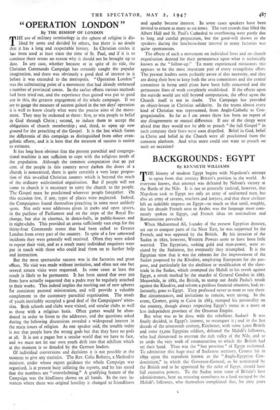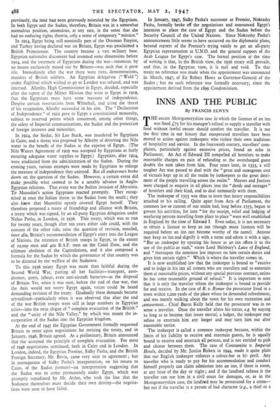BACKGROUNDS : EGYPT
By KENNETH WILLIAMS
THE history of modern Egypt begins with Napoleon's attempt to upset from that country Britain's position in the world. A3 everyone knows, that attempt was defeated by Nelson's victory at the Battle of the Nile. It is not so generally realised, however, that Napoleon took to Egypt not only an army of uniformed men, but also an army of savants, teachers and lawyers, and that these civilian! left an indelible impress on Egypt—so much so that until, roughly, the last decade French next to Arabic was the language most com- monly spoken in Egypt, and French ideas on nationalism and Romanticism prevailed.
When Muhammad Ali, founder of the present Egyptian dynasty, set out to conquer parts of the Near East, he was supported by the French, and was opposed by the British. By his invasion of the Sudan in 1820, however, Western Powers seem to have been little worried. The Egyptians, seeking gold and man-power, were re- sisted by the Sudanese, but eventually they triumphed. It is the Egyptian view that it was the reforms for the improvement of the Sudan proposed by the Khedive, employing Europeans for the pur- pose, and particularly for the abolition or modification of the slave- trade in the Sudan, which prompted the Mandi to his revolt against Egypt, a revolt marked by the murder of General Gordon in 1885. Meanwhile, in 1882, the British, to stamp out Arabi Pasha's revolt against the Khedive, and reform a perilous financial situation, had, re- luctantly, gone to Egypt. They professed never to want to stay there. But circumstances, and invitations to remain, were strong. In the event, Cromer, going to Cairo in 1883, stamped his personality on the country, though always respecting Egypt's status as a more or less independent province of the Ottoman Empire.
But what was to be done with the rebellious Sudan? It was finally decided, in Egypt's interest, to reconquer it ; and in the last decade of the nineteenth century, Kitchener, with some 5,000 British and some 15,000 Egyptian soldiers, defeated the Mandi's followers, who had threatened to overrun the rich valley of the Nile, and so to undo the very work of reconstruction to which the British had set their hand. Thus was the " lost province " of Egypt reclaimed. To administer this huge tract of Sudanese territory, Cromer hit in 1899 upon the expedient known as the " Anglo-Egyptian Con- dominium," in which the Governor-General, to be nominated by the British and to be appointed by the ruler of Egypt, should have full executive powers. To the Sudan went some of Britain's best administrators, bent on restoring seemliness to a land ravaged by the Mandi's followers, who themselves complained that, for sixty years previously, the land had been grievously misruled by the Egyptians. In both Egypt and the Sudan, therefore, Britain was in a somewhat anomalous position, anomalous, at any rate, in the sense that she had no enduring rights therein, only a sense of temporary " mission."
In 1914, Egypt being still nominally part of the Ottoman Empire, and Turkey having declared war on Britain, Egypt was proclaimed a British Protectorate. The country became a vast military base. Egyptian nationalist discontent had assumed some dimensions before 1914, and the treatment of Egyptians during the war—treatment by no means exclusively meted out by Britons—was such that it grew rife. Immediately after the war there were riots, demonstrations, murders of British soldiers. An Egyptian delegation (" Wafd ") under Zaghloul which wished to go to London was refused, and was interned. Allenby, High Commissioner in Egypt, decided, especially after the report of the Milner Mission that went to Egypt in 1919, that the Egyptians must have some measure of independence. Despite certain reservations from Whitehall, and using the threat of his resignation, Allenby succeeded in his aim. The " Declaration of Independence" of 1922 gave to Egypt a constitutional monarchy, subject to reserved points which concerned, among other things, the safety of Imperial communications, the Sudan and the protection of foreign interests and minorities.
In 1924, the Sirdar, Sir Lee Stack, was murdered by Egyptians in Cairo, and a threat was proposed by Allenby of diverting the Nile water to the benefit of the Sudan at the expense of Egypt.. (The Nile Waters Agreement of 1929 was accepted by Egyptians as fairly ensuring adequate water supplies to Egypt.) Egyptians, after 1924, were eradicated from the administration of the Sudan. During the ensuing years, various attempts were made by Egyptians to enlarge the measure of independence they enjoyed. But all endeavours broke down on the question of the Sudan. However, a certain event did make possible what seemed to be a notable advance in Anglo- Egyptian relations. That event was the Italian invasion of Abyssinia. To Mussolini's action Egyptians reacted promptly. They recog- nised at once the Italian threat to the Sudan from the south ; they also knew that Mussolini openly coveted Egypt herself. They therefore proposed a treaty of friendship and alliance with Britain, a treaty which was signed, by an all-party Egyptian delegation under Nahas Pasha, in London, in 1936. This treaty, which was to run for twenty years, though after ten years either side could, with the consent of the other side, raise the question of revision, entailed, inter alia, Britain's recommendation of Egypt's entry into the League of Nations, the retention of British troops in Egypt, to the extent of 20,000 men and 400 R.A.F. men on the Canal Zone, and the ultimate abolition of the Capitulations, and it also composed a formula for the Sudan by which the governance of that country was to be dictated by the welfare of the Sudanese.
To this 1936 treaty Egypt was more than faithful during the Second World War, putting all her facilities—transport, aero- dromes, ports, labour, even anti-aircraft batteries—at the disposal of Britain. Yet, when it was seen, before the end of that war, that the Axis would not worry Egypt again, voices could be heard demanding revision of the treaty. Gradually these demands became crystallised—particularly when it was observed that after the end of the war British troops were still in large numbers in Egyptian cities—into the twin slogan of " complete evacuation of the British" and the "unity of the Nile Valley," by which was meant the in- corporation of the Sudan into the Egyptian kingdom.
At the end of 1945 the Egyptian Government formally requested Britain to enter upon negotiations for revising the treaty, and in January, 1946, Britain agreed. As a preliminary, Britain announced that she accepted the principle of complete evacuation. For most of 1946 negotiations continued, both in Cairo and in London. In London, indeed, the Egyptian Premier, Sidky Pasha, and the British Foreign Secretary, Mr. Bevin, came very near to agreement ; but in consequence of Sidky Pasha's interpretation, on his return to Cairo, of the Sudan protocol—an interpretation suggesting that the Sudan was to come permanently under Egypt, which was promptly repudiated by Mr. Attlee, who took the line that the Sudanese themselves must decide their own destiny—the negotia- tions were seen to have failed. In January, 1947, Sidky Pasha's successor as Premier, Nokrashy Pasha, formally broke off the negotiations and announced Egypt's intention to place the case of Egypt and the Sudan before the Security Council of the United Nations. Since Nokrashy Pasha's announcement little seems to have occurred on the diplomatic plane, beyond reports of the Premier's trying vainly to get an all-party Egyptian representation at U.N.O. and the general support of the Arab League for Egypt's case. The formal position at the time of writing is that, in the British view, the 1936 treaty still prevails, and that, in the Egyptian view, it is null and void. To that treaty no reference was made when the appointment was announced in March, 1947, of Sir Robert Howe as Governor-General of the Sudan ; but no such reference was formally necessary, since the appointment derived from the 1899 Condominium.



































 Previous page
Previous page